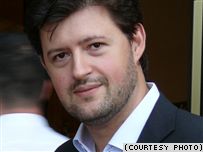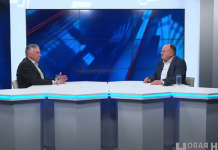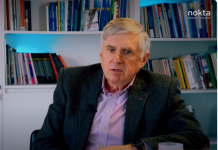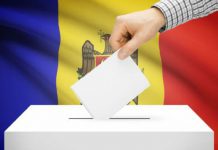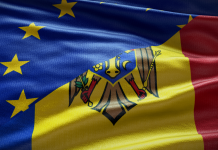Corneliu RUSNAC, Moderator IMEDIA: Good day dear listeners! I am Corneliu Rusnac and I invite you to a broadcast of discussions on topics of foreign policy, produced with the support of the „Foreign Policy Association” and financed by „Friedrich Ebert” Foundation.
In today’s show I would like to present you an interview with Mr. Andrei Popov, Deputy Minister of Foreign Affairs and European Integration. Lately Mr. Andrei Popov visited Kiev, Bucharest and Moscow where he held consultations with colleagues from the Ukrainian, Romanian and Russian Ministries of Foreign Affairs. I asked Mr. Popov what these consultations had brought new in relationships with the 3 countries and what had been the most important topics addressed during these meetings.
1. Diplomatic consultations between Republic of Moldova and Romania, Ukraine and Russia
Andrei POPOV, Deputy Minister of Foreign Affairs and European Integration: Foremost, all three states, our neighbors Romania and Ukraine as well as the Russian Federation are countries of paramount importance for the success of Republic of Moldova as an independent and democratic state, capable of moving towards European integration and strengthening democratic institutions. I would like very much to stress that the message that we came with and the one we insisted upon in all three capitals Bucharest, Kiev and Moscow were identical. By this we sent a message of consistency and reliability. We have topics to discuss with Moscow as well as Kiev, and Bucharest. To a large extent, the areas of interest are more or less convergent, there are misunderstandings or errors of interpretation but it is very important not to go to the length of calling things by their names, thus turn into serious and responsible partners. It is very important for the people to have trust in what we say. And in Moscow we spoke about the need for new approaches regarding the European path of the Republic of Moldova and the need to overcome stereotypes such as the one stating that this very objective of advancement on the path of European integration would lead to worsening relations between Republic of Moldova and the Russian Federation. We talked very openly about this. But also about the importance of underlining by Russian interlocutors of the principle, on which they very much insist in private, that the only viable settlement of the Transnistrian conflict is based on respect for sovereignty and territorial integrity of Republic of Moldova. We spoke about the socio-humanitarian cooperation and joint actions, particularly within the CIS și that we are going to take in order to mark the 65th anniversary of the end of World War II, the Great Patriotic War, about the necessity to leave ideology behind in some approaches. The issue of medals was one of great interest including in communication with experts and with the media. We felt we should refine some arguments to explain the specific situation in which people of Moldova were during the war. I even brought my own example in which one of my grandfathers was in one army, while the other in another army, we must bring peace and reconciliation in society and we called in discussions with several interlocutors for respect of these realities and that we do not intend to offend any color of someone’s memory or to engage in actions that, as said in the press, would neglect the contribution made by veterans to the victory.
The importance of Moldovas efficient cooperation within the CIS, I said and I repeat it, Republic of Moldovas cooperation within the CIS currently brings many advantages. It is an issue, again, full of ideology. In recent years cooperation with the CIS was associated with a single party, the remainder being presented as advocating for getting out of this situation. Hence, developments after the July 2009 elections in Republic of Moldova, the fact that we manage to get along with Romania and Ukraine in a pragmatic way, to advance in our relations with the EU and U.S., but not dispel the connections we have built in the Eastern area, including the CIS, I think that in itself these are powerful messages that I felt resonated in some offices of the Russian Federation we had discussions in. Note that apocalyptic predictions about the policy that will be promoted after the elections by the Alliance for European Integration, one that would be hostile towards the Russian Federation, did not come true. And this message begins to be understood and I believe that during the contacts at various levels which will be held between the leadership of the Russian Federation and Republic of Moldova this message will be explained and clarified further and we will move forward in this direction and not hide from openly saying that there are areas where our interests do not coincide. These are not many; however, it is very important to discuss these issues frankly, but not to start with public discussions, statements in the media and accusations. We have channels of communication, we should use them, but it is very important to focus on the positive agenda of our relations, on building up, and we have a lot to build over, there is a potential that we have to exploit.
In Kiev, and with Ukrainian counterparts, because the Ukrainian Deputy Minister of Foreign Affairs Constantin Eliseev was in Chisinau, we talked about the need to find a compromise along the win-win paradigm on two troublesome matters that are poisoning the atmosphere of bilateral relations for more than a decade. It is about completing the demarcation process and settlement of property relations. And we have declared that we are very keen on building strategic partnership relations with the Ukraine, also that we have national interests, the interests of Moldovan citizens, but also those of some localities, and it is in our interest to come to meet those interests and find solutions that would not impede them. And again, in this dialogue, we took into account the concerns and interests of the other party, because in a serious dialogue between two partners you need to think about your interests but also about the position and constraints within which your partner is acting.
In Bucharest there was a very open discussion in a more than cordial atmosphere I could say. We talked about the new phase we have entered in the relations between our two countries, and Romania as it is known is the only European neighbor of Republic of Moldova and we talked about specific mechanisms, how to transform into life the desideratum of building a privileged and strategic partnership, but also how to move the focus from a declaratory position towards actions, projects, economic cooperation and infrastructure programs. Of course we discussed with our partners in Bucharest the need to eliminate all misunderstandings and misinterpretation, as I call them, which have proliferated in recent years due to some primitive approaches, undertaken by some of the leadership in Chisinau, but also because of stereotypes, clichés propagated by the media in Moldova as well as in Romania. We must have a realistic and European approach, about how Republic of Moldova and Romania, as independent states must capitalize on their numerous competitive advantages that this very special relationship of the two countries involves.
Corneliu RUSNAC: In Moscow you have discussed among other things the Transnistrian problem. To what extent is Russia now ready to contribute to solving the Transnistrian crisis?
2. The level of Russia’s involvement in resolving the Transnistrian crisis
Andrei Popov: Russia is a major player in this process. It is a participant in the 5 +2 format. It has important influence and communication instruments. It has recently launched a program of financial support for pensioners in the Transnistrian region giving them, regardless of citizenship, each $ 15 per month. The special relationship that Tiraspol had with Russia over recent decades is known, be it the assistance for Transnistria coming from the Russian Federation including, or primarily economic one. Existence of relatively stable social and economic situation in Transnistria was mimed only through a more than lenient policy of Gazprom, which did not require payment of charges for gas and an enormous debt for gas consumed has accumulated and the citizens of Transnistria were inoculated a perception that utilities are cheaper in Transnistria. Sure, without the support of Russia and without preferential treatment enjoyed by the Transnistrian region from the Russian Federation these things would not have been possible, and of course such preferential treatment, these relationships provide Russia with some responsibility, but also some tools and channels of communication. I have talked a lot and in detail about the new approach of the government in Chisinau towards the principles of the Transnistrian settlement. Pragmatic approach, aiming not only at political but also at socio-economic sphere, revival of the working groups activity, not as PR action but as the primary goal, which comes to restore lost connections between the two sides, restore a sense of communion between different socio-professional categories on both banks and solve problems that people face in everyday life. Initiative on confidence measures, several initiatives that demonstrate the will of Chisinau to depoliticize some issues and to engage in a direct and effective dialogue with interlocutors in Tiraspol, for the most part along with political representatives, all these actions denote a new approach, a new fresh breeze in Chisinaus approach to the Transnistrian settlement. So far, however, we cannot talk about measures of reciprocity. Moreover, there were a number of challenges, arrests, detentions, unfriendly statements. We believe it is vital that this confidence building process be supported and not undermined, and definitely the Russian Federation, including by means of direct communication, but also in the 5 + 2 format has sufficient arguments to help us in this regard and we felt that such approaches are shared in Moscow as well.
3. Elections in Ukraine and their impact on relations with Republic of Moldova
Corneliu RUSNAC: After the elections in Ukraine could there be significant changes in Chisinaus relations with Kiev or will things evolve naturally, predictably, how do you think?
Andrei Popov: We must not allow ourselves to be carried by fate and taken away by the wave. We must build our relations; we have to be serious, responsible and pragmatic. We must be aware that our situation obliges us to have the best relationship possible with the only 2 neighbors we have: Romania in the west, Ukraine to the east. These are the two countries which the Republic of Moldovas success depends upon, consequently the first contacts have already been set, the prime-ministers, foreign ministers talked on the phone. I confess that while in Moscow I had a discussion with Ambassador of Ukraine in Moscow, Constantin Grishinko who the day after was appointed Foreign Minister, and Mr. Foreign Minister has held in this position during 2003-2005 and during the 1990s years was co-chair of the committee on border demarcation and knows extremely well the subtleties of border demarcation file as well as the settlement package reached when the border treaty was signed in 1999. This package covered three points: access for Republic of Moldova to the Danube through the 430 meters at Giurgiulesti, and resolve the complicated situation in Basarabeasca and as all people living there know that the whole of Basarabeasca is part of the Republic of Moldovan and the border does not pass, as was clear from documents prior to the agreement, through the middle of Basarabeasca, and Palanca, the sector of 7.7 kilometers of road that Moldova received from Ukraine in 1995 and which according to this very settlement package of 1999, ratified by Parliament in July 2001, was to be transferred back into Ukrainian property, I repeat under a settlement package.
The other case now presents the transfer act, according to Border Treaty, ratified in the summer of 2001, specifically in July; Republic of Moldova was to transmit within a month into the property of Ukraine the sector of 7.7 km and the land area, but not the underground, as was speculated. On February 11, 2002, Tarlev government, obviously with the necessary authorizations from the supreme leadership of the country transmitted to Ukrainian the road, the respective portion of road, 7.7 km in length, and 23 meters on average in width, if multiplied there will be 18 hectares. But they did not undertake the final act and did not transmit the registration number of the sector. It’s like selling someone a house, you get the money instead, you reached an understanding, you shook hands, but after that it is found that the act which you transmitted was not complete, it is not removed from the land register and is a remaining legacy from the previous government to complete this work. Everyone needs to remember one thing: during the finalization of this work we also take into account the national interest of Republic of Moldova and the interests local citizens, they will be offered a privileged system of access and life and the means to maintain their commercial-economic activities including a market adjacent to the road. Unfortunately, the issue is highly politicized. Public opinion was saturated with a number of speculative falsehoods which spread hysteria among the population and create an atmosphere of tension in society.
It is very good to say very responsibly and seriously what the truth is. Truth No. 1 is that the ground under this road is not transmitted; it remains an inalienable territory of Republic of Moldova. The truth number 2 is that the 926 hectares across the road have been and will remain in the constituency of the Republic of Moldova, nobody doubts this despite speculation. Truth number 3 is that citizens, residents of Palanca will have a favorable regime and during recent weeks concrete measures have been undertaken, traffic signs have been installed, pedestrian crossings have been established, permits issued by Moldovan border guards were eliminated, these were issued based on an identical procedure for all inhabitants of the cross-border are on a perimeter of 1222 km along the border with Ukraine, but for Palanca residents these permits were eliminated, and now we are in the process of completing a concrete solution for the disposal of a patrol that has been placed on this sector by the Ukrainian side. We will make a barrier that will remove the need for this internal patrol. Here are our efforts and these are definitely serious efforts and come to meet citizens’ interests and ensure an appropriate climate for the implementation by Republic of Moldova of its international obligations, so that it could not be improperly presented and interpreted as a betrayal, a concession of our interests. It would be a great disappointment, and would be a huge blow to the interests of Moldova if we fail to manage this very important issue and if we fall short of actually raising the level of our relations with Ukraine to a strategic partnership so that we can finally focus on the big issues related to the Transnistrian conflict settlement, energy security, infrastructure projects and cooperation in international bodies, primarily advancing the interests of both countries to approach and swift integration into the EU. Instead of presently discussing these issues, 95% of our attention is captured by other issues which we have inherited, as I said demarcation, issues of ownership, but I hope very much that very responsibly and pragmatically we will find solutions to these problems coming from the past and begin to look ahead, to build a stable relationship of strategic partnership between Republic of Moldova and Ukraine as we do at present between Moldova and Romania.
4. The evolution of relations with Romania
Corneliu RUSNAC: How could one evaluate relations with Romania if we were to sum up the developments in recent months?
Andrei Popov: Relations with Romania were re-launched in the early hours of confirmation of the new government by abolishing the unfair measures of imposing visas for Romanian citizens in 2009. Small traffic agreement was signed quickly. The first recipients of this document will receive permits of small traffic on the last days of March, and will be able to travel to Romania in April already. Thus, we in Chisinau, we have removed everything unnatural and all artificial conditionalities that were imposed by former rulers and we do not treat Romania as the main enemy, as an external foe, but as a friend of Republic of Moldova, a country that has much to offer Moldova and so we must have a dialogue in which we respect and understand each other. There are sensitivities in our relationship, but it is very important for Moldova to know how to exploit the openness which Romania manifests, and concerning the support for Moldova’s European course, and regarding the transfer of valuable experience which Romania gained in the process of European integration. Here we focus now on creating an atmosphere appropriate to exploiting this potential, and by institutionalizing our relations so that they would not only be at the level of Heads of State, but to descend down to the level of governments, ministries, institutions, agencies, central and local government. We are very seriously considering the creation of mechanisms for transferring experience, for communication, for example our Foreign Ministries has already held several consultations which were very fruitful and very important to us, and we have agreed to intensify these consultations.
The visit of Prime Minister Vlad Filat to Bucharest in November was very important, as well as President Traian Basescu’s visit to Chisinau in January. Indeed these were some signs of recovery in the relationship. The political green light was given. Economically, here this week the Romanian government decided to grant un-reimbursable aid to Moldova, it is not credit but financial aid worth 100 million Euros. These are genuine manifestations of the openness shown by Romania towards Republic of Moldova and of the serious and responsible attitude of the Moldovan Government regarding its own state interests, the state of Republic of Moldova. And thus we go ahead and create the basis for a very fruitful relationship, very close one, even privileged between two countries that go together into the EU. Romania is already in the EU. And already from within the EU, with other friends of Moldova, there has also been established a group of Moldovas friends within the EU, they help Moldova and we should know how to capitalize on this support. But, at the same time we must say frankly that there is some inertia approach in Romania, in certain political areas. There is a certain inclination towards identity and symbolism. We want not to ignore everything that binds us, which also makes our relationship unique, but indeed to make sure there is a European spirit of communication between two neighboring states, which have mutual respect and are sensitive to the interests of each other. And there are certain sensitivities in Republic of Moldova and I think that with the new government in Chisinau, with a new quality of communication, our colleges in Bucharest will have a better sense of the realities in Moldova and we can build a relationship, indeed based on the European spirit.
5. The impact of adopting a new Constitution on relations with the EU
Corneliu RUSNAC: And now, one last question, it is rather based on internal politics but has impact on the outside. I want to ask if there is a risk that the decision of the Alliance for European Integration to call a referendum to adopt a new Constitution could undermine the relations with the EU, as confirmed by some analysts?
Andrei Popov: It’s a complex issue, there are several opinions, in fact the EU is building its relations with aspiring countries according to their commitment to the values of the rule of law, constitutional framework, how to change the constitution, the principle of consultation with external partners and the principle of creating clear and predictable rules of the game that may even sometimes go to the detriment of those who are in government. This is a consideration. Another consideration is political. Everyone in the EU, and I believe that radio listeners are aware of a whole new openness towards Republic of Moldova from the international community manifested both in the west but in the east. December 24th donors’ conference in Brussels, the second round simultaneously, all in late March, will be launched on the EU Association Agreement are just two of many very clear examples in this respect. Agreement with the U.S., Millennium Challenge Corporation offering Moldova a 262 million dollar grant for infrastructure projects, is another example. Contacts are much more intense at the level of Foreign Ministers, state leadership, government leadership, a positive image that Moldova has managed to build in the Western press. All these things are an asset.
It is extremely important to maintain this momentum. And not become victims of political circumstances in which people had some expectations, but for now not all of them see, many actually do not see numerous good changes, to the contrary many seem to believe that things are getting more complicated. Road quality would be something that unites us all and we see in what a state they are. It was a tougher winter. It is a call for calmness among citizens. There is a word that you should not show unfinished work because it can scare people away. It’s like someone comes in the midst of repairs and gets scared and says "no, no, it is better as it was before”, without the vision and understanding that in a few months things will settle down and will look better. Moldova has a very unfortunate example, the election of 2001, when after very, very painful reforms but vital for Republic of Moldova made in 1998-1999, a government was dismissed. It took all the political cost of very crucial reforms for the future of Moldova, for the way Republic of Moldova develops in decades, but in the midst of these reforms elections were carried out. The Communist Party came to power just at the moment when the results of these reforms have started to be seen and life began to improve. We are with the respective risks; it may be a risky parallel, in a similar situation. It is a coincidence of economic crisis, political instability related to the refusal of the Communist Party to vote for the candidate of the Alliance, Marian Lupu. And here we are all exposed to this state of uncertainty and need to find a reasonable solution, a constitutional and legal one from this situation. It would be very unfair and damaging to speculate, without remorse, of course, and very brutally on the difficulties facing the new government due to irresponsible policy that was promoted by its predecessors who have left a huge hole in the budget, to take advantage of this situation, for people to become hysterical, frightened and not have the patience and be exposed to new electoral tests. We must find a common denominator between these two concerns: the concern to ensure legitimacy and full respect of the constitution and the recommendations offered by the supreme institution of expertise in this area, the Venice Commission, but also the political reasons that are present. We have a certain destiny and we should not step on the same rake the second time because we have the experience of the years 1999-2000. Many people know, and I see as a diplomat that Republic of Moldova lost many trains, also in what concerns the progress towards the EU so many opportunities were lost that we are now recovering. It is very important to give this government a chance to lead the way along these painful reforms it has launched.
Corneliu RUSNAC: Dear listeners, I remind you that you have listened to an interview with Mr. Andrei Popov, Deputy Minister of Foreign Affairs and European Integration of Republic of Moldova. Here we conclude our program for today. The show was produced with the support of the Foreign Policy Association and funded by the Friedrich Ebert Foundation. I, Corneliu Rusnac, am saying goodbye and will be waiting for you with a new program. See you soon!


